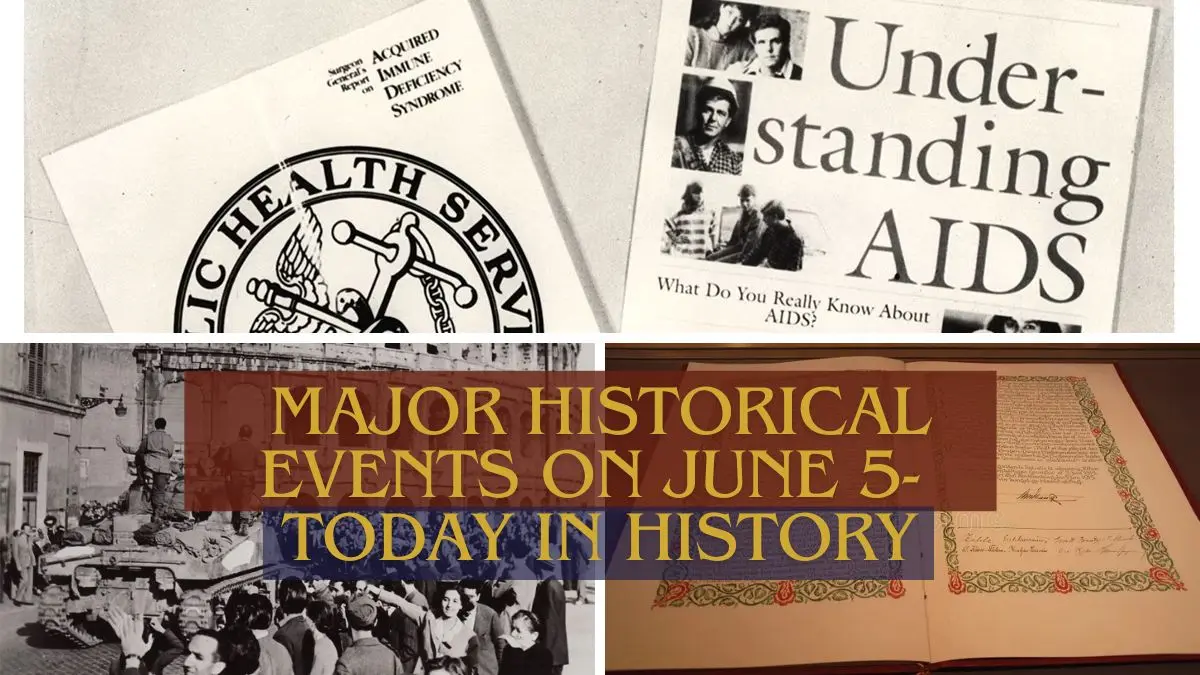Step back in time to explore the Major Historical Events on June 5 that shaped the world. From ground-breaking discoveries to pivotal moments, uncover the stories behind the headlines that made history on this date.
Major Historical Events on June 5- Today in History
Adam Smith’s Baptism – 1723 AD
Adam Smith, a prominent social philosopher and political economist, known for his influential work “The Wealth of Nations,” was baptized in Kirkcaldy, Fife, Scotland, marking the beginning of a life that would shape economic thought.
Denmark’s Constitutional Shift – 1849 AD
Denmark transitioned from absolute monarchy to constitutional monarchy, instituting a new constitution that guaranteed a parliament, freedom of the press, religious freedom, and the right to assemble and form associations in 1849.

Birth of John Maynard Keynes – 1883 AD
John Maynard Keynes, the pioneering economist renowned for his Keynesian economic theories addressing prolonged unemployment, was born, setting the stage for a revolution in economic policy and thought.
Henry Ford Initiates 32-Hour Work Week – 1937 AD
In a groundbreaking move to improve worker productivity and well-being, industrialist Henry Ford introduced a 32-hour work week in 1937.
Joe Clark’s Birth – 1939 AD
Joe Clark, who made history in 1979 by becoming Canada’s youngest prime minister, was born, heralding the arrival of a significant political figure in Canadian history.
Allied Entry into Rome – 1944 AD
During World War II, Allied forces triumphantly entered Rome, marking a pivotal moment in the conflict and the beginning of the end for Axis powers in Italy.

The Marshall Plan Proposed – 1947 AD
U.S. Secretary of State George C. Marshall, in a Harvard University address, proposed the Marshall Plan, advocating for a European self-help program funded by the United States to aid in post-war recovery.
Israel’s Preemptive Strike – 1967 AD
Amid escalating tensions with Egypt, Syria, and Jordan, Israel launched a decisive preemptive air assault, leading to significant territorial gains including the Old City of Jerusalem and the Gaza Strip, before a cease-fire was declared.
Assassination of Robert F. Kennedy – 1968 AD
While campaigning for the U.S. presidency, Robert F. Kennedy was tragically shot by Sirhan Sirhan at the Ambassador Hotel in Los Angeles, leading to his death the following day, a pivotal moment in American history.
First AIDS Report – 1981 AD
AIDS was first reported after a rare pneumonia was detected in five homosexual men in Los Angeles, marking the beginning of the global awareness and response to the HIV/AIDS epidemic.

Death of Ronald Reagan – 2004 AD
Ronald Reagan, the 40th president of the United States, known for his conservative policies, anticommunism stance, and charismatic style, passed away at age 93, leaving a lasting legacy on American politics.
Ray Bradbury’s Passing – 2012 AD
Renowned American author Ray Bradbury, best known for his dystopian classic “Fahrenheit 451,” died at age 91, leaving behind a legacy of influential literary work that continues to inspire.
Also Read: Major Historical Events on June 4- Today in History









